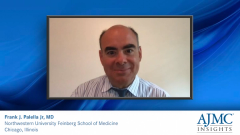
Future Opportunities to Improve PrEP Access and Management
Carl Schmid and Lynne H. Milgram, MD, MBA, CPE, conclude with sharing ideas that can provide more substantial access to PrEP and battle unmet needs in PrEP management.
Episodes in this series

Carl Schmid: We already have the CDC [Centers for Disease Control and Prevention] guidelines for PrEP [pre-exposure prophylaxis]. It’s important to get those out among providers. We also have the US Preventive Services Task Force recommendations, which say that PrEP is a grade A recommendation and should be recommended to people who are eligible for it. That provides coverage by insurance companies without cost-sharing for PrEP. Those are great things. But then we need to implement those and make sure they’re happening. You could do that through electronic health records, making sure community health centers and Medicaid programs report and use this as a quality measure.
It isn’t only PrEP. It should also be HIV testing, which is also part of the guidelines and a grade A recommendation by the US Preventive Services Task Force. People should be offered routine HIV testing. If they’re living with HIV, they should be strongly encouraged to be linked to care and treatment. If they aren’t found to be positive but are at risk, they should have a discussion about opportunities for PrEP. That should be happening in our Medicaid program, with private insurers, and in community health centers. It should be part of the electronic health record. That’s one good way to incorporate HIV testing and PrEP in the medical record.
There are still a lot of challenges. There are great opportunities as well. One of the challenges is still stigma. Hopefully people will continue to talk about HIV and the people who are impacted by HIV. If we have national campaigns, that will help. Commercials on TV [television] can help. Having peers help in that regard as well.
Lynne H. Milgram, MD, MBA, CPE: It starts with the medical history, and it starts in the providers’ offices. They need education. They need to understand the CDC guidelines. It starts with them, and then we’re able to code appropriately and mine the data if we want to. But as of now, we aren’t doing that, so we miss a lot of opportunities, starting with the provider.
Carl Schmid: Another barrier is the lack of funding. There’s some funding for community health centers to do PrEP, but we need additional funding for the CDC to conduct a national grant program for PrEP. That’s one of the barriers. It’s really difficult to get funding from Congress. But this is an area in which the CDC should be investing additional dollars. The president proposed a 10-year $9.8 billion program for PrEP. Unfortunately, it’s a mandatory program, and that’s going to be difficult to get passed through Congress. There’s great interest by the federal government to increase PrEP uptake, but we need additional dollars to make that happen. That’s something we’re working on.
Maybe there will be legislation. There were some bills already introduced to create national PrEP programs. But we know that it takes time for Congress to come to some decisions. We have our own decisions to make in the HIV community regarding what we want and what’s going to work best. Then we have to implement it and fund it. There are a lot of opportunities. Let’s work with where we are right now. Around 80% of the people who are eligible for PrEP have private insurance, Medicaid, or Medicare. Let’s make sure PrEP works for them, but let’s also make sure there’s a national program for outreach. And for people who can’t afford PrEP, [let’s make sure] there’s a program for them as well.
Transcript edited for clarity.
Newsletter
Stay ahead of policy, cost, and value—subscribe to AJMC for expert insights at the intersection of clinical care and health economics.














